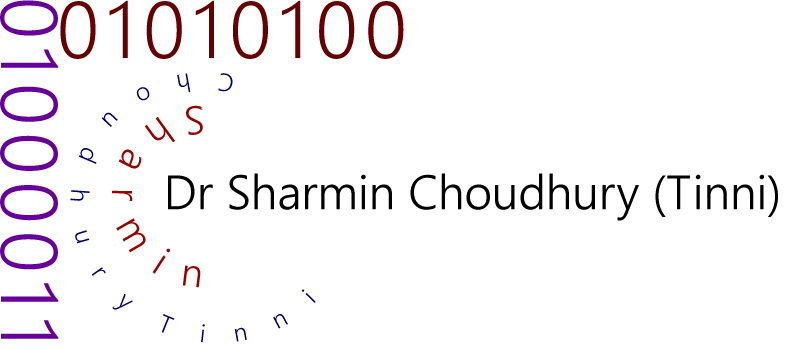Dr Sharmin (Tinni) Choudhury, PhD. B.Com, B.Eng, Grad. Cert Research Commercialisation
"What problems does an Eskimo have ice fishing?", this was the topic a student once threw at me when I offered to do a two-minute impromptu speech that was to be analysed by a guest expert for effectiveness. I am not certain what my cheeky student was expecting, but I am certain he did not expect me to talk about how the then-ongoing war in Iraq was negatively impacting the native population of Alaska. You see, some months ago, I had seen a news story on how abled bodied men from many remote Alaskan communities were in Army reserves and had been called up to serve in Iraq. This, in turn, meant there weren't people left to go ice fishing.
I have a good memory for narratives. As a result, I have silos of information in my head which I can draw upon to come up with unexpected but effective solutions to problems thrown at me. However, I do not have a perfect memory. For example, I am terrible with names. Thus, we come to my work in the field of metadata, knowledge management, visual analytics and sensemaking.
We live in an age of data abundance, and my work has revolved around researching and developing ways of harnessing the data so all of us can have a good memory from which we can easily draw information, that we can then apply to make our lives, as well as the world at large better.
I have been working in research for over ten years with the focus of my research being data in all its form. Following the completion of my undergraduate degree, my research focused on data preservation with the PANIC project (2002-2005). I then worked in commercial software development for a year before starting my PhD in Ontology-based knowledge management (2006-2010). My PhD tackled the issue of data from a personalisation aspect. It explored how domain ontologies could be used to streamline the ingestation of data and improve the delivery of the data.
The goal was to assist the user in better meet their information needs and support them through the process of converting data into knowledge as they made sense of the data presented to them. During my PhD, I also undertook some teaching and was part of the teaching staff of four subjects over multiple semesters.
Following my PhD, I undertook a three-year post-doc at Middlesex University in London, UK (2010-2013). In the UK, I worked with the Interaction Design Centre (IDC). There I conducted further research into data analysis and human data interaction through the nascent field of Visual Analytics through the EPSRC funded Making Sense project. I also contributed to my research group’s investigations into sensemaking and big data. I contributed actively to the development of INVISQUE, which was at the time Middlesex University’s flagship visual analytics system. I also contributed to the development of M-Sieve, Middlesex University’s big data visual analytics system and was a principal researcher into the core concept powering M-Seive, the Concern Level Assessment (CLA). A series of videos regarding my Middlesex projects, including INVISQUE and M-Sieve, are found here. In the UK I also gave a couple of guest lectures in XML, supervised a master student and hosted a workshop on Big Data for masters students.
Following my return home to Australia, I worked to secure funding for a research project in the field of visual analytics and smart wearables. I was unsuccessful and shifted my focus towards the commercial environment and start-ups. Even in this realm planned happenstance came into play, as did my willingness to say “yes” to interesting opportunities and meeting.
There are a lot of overlapping skillsets between research and startups. As a result, my current tenure in entrepreneurship feels like a natural extension of my career and training to date. Where will happenstance take me next? I am looking forward to finding out!
